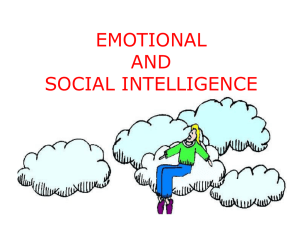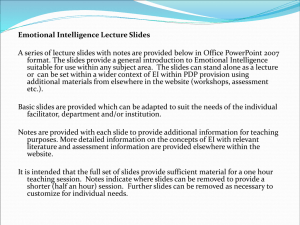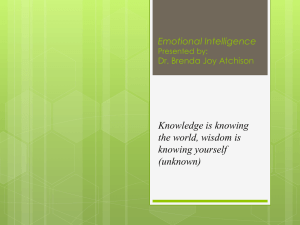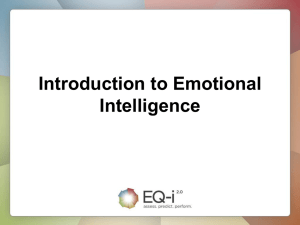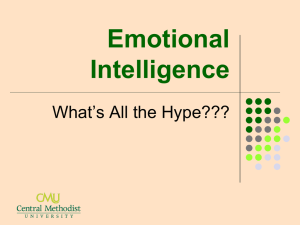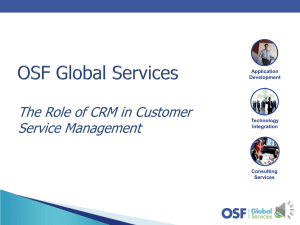Emotional Intelligence
advertisement
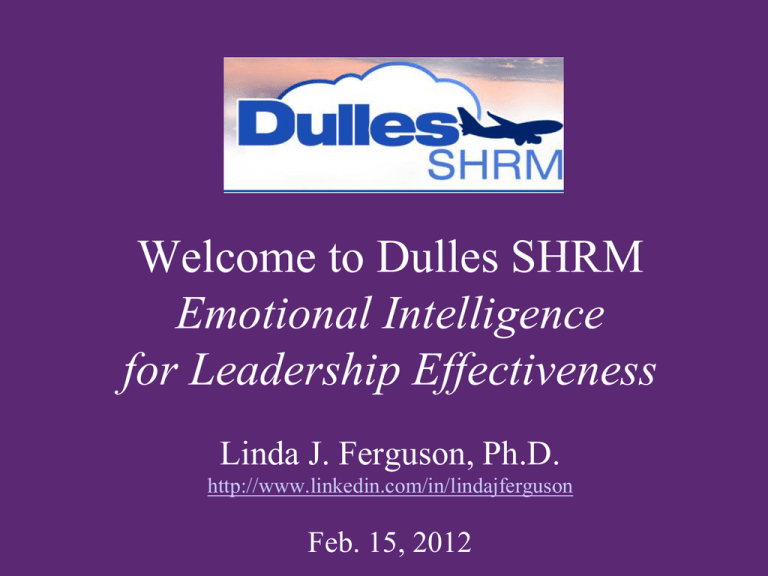
Welcome to Dulles SHRM Emotional Intelligence for Leadership Effectiveness Linda J. Ferguson, Ph.D. http://www.linkedin.com/in/lindajferguson Feb. 15, 2012 Learning objectives • A working knowledge of Emotional Intelligence and why it is important for personal and professional success. • An understanding of the five competencies related to Emotional Intelligence • An understanding of how to apply Emotional Intelligence to Leadership regarding decision making and leading teams Leadership Effectiveness What came from your table discussion? “Each relationship you have with another person reflects the relationship you have with yourself” Alice DeVille How does this apply to Leadership? Emotional Intelligence “We are being judged by a new yardstick; not just how smart we are, or by our training and expertise, but also how well we handle ourselves and each other.” Daniel Goleman, Ph.D. Working with Emotional Intelligence, 1998 CRM Goleman’s Research • Why do people with high IQ sometimes flounder while those with modest IQ do surprisingly well? • Emotional Intelligence provides a foundation for emotional competencies that is a solid predictor of job performance and workplace success. What is Emotional Intelligence? Emotional intelligence is not about being nice all the time. • It is about being honest. Emotional intelligence is not about being “touchy-feely.” • It is about being aware of your feelings, and those of others. Emotional intelligence is not about being emotional. • It is about being smart with your emotions. •Strong link in brain between reasoning and emotions Personal Benefits of Emotional Intelligence • Greater career success • Stronger personal relationships • Increased optimism and confidence • Positive Psychology • Better health CRM Personal Emotional Skills: First three E.Q. Competencies: • Self Awareness • Self Regulation- Managing Your Own Emotions • Self Motivation “When our center is strong everything else is secondary, even the risks” Ellie Wiesel, Nobel Peace Prize winner Professional Benefits of Emotional Intelligence •Effective leadership skills • Improved communication • Less workplace conflict • Better problem solving skills • Increased likelihood of promotion CRM E.I. Social Competence Other Oriented Emotional Skills: • Empathy - Recognizing and Understanding Other’s Feelings • Influence Others • Commitment from others • Awareness of Emotional Feedback from Others – Social Cues The Five Essential Competencies of Emotional Intelligence • Self-Awareness • Self-Regulation Relate to Ourselves • Self-Motivation • Empathy Relate to Others • Social Skills for Effective Relationships CRM CRM Emotional Literacy • How Many Different Emotions Do You Know? • Can you identify when you are feeling them? CRM “If we are in a heightened state of agitation or anger we cannot make good decisions, we cannot reason well.” Christine Casper Communication, Motivation & Management Inc. CRM Self-Regulation People who can regulate their own emotions have the following characteristics: • Self-control – Manages impulsive feelings and emotions – Stays composed – Thinks clearly under pressure • Conscientious – Meets commitments, keeps promises – Is accountable – Organized and careful in work Paying attention to your Triggers • Your emotions come from within you. They come from your beliefs and values, biochemistry, past programming from childhood, and life experiences • Be aware of, and learn to manage, your own emotional “triggers” or “hot buttons” Myth- Others can make you feel a certain way CRM Self-Motivation People who are Self-motivated show these qualities: • Achievement drive – Results oriented – Set challenging goals – Pursues continuous improvement • Committed – align personal and organizational goals – Readily makes personal or group sacrifices to meet larger goals – Has sense of purpose – Use core values to make decisions • Initiative – Ready to act on opportunities • Optimistic – Persistence in pursuing goals – Operates from hope of success rather than fear of failure – Sees setbacks as manageable rather than a personal flaw Focus on what You Can Do • What can you do differently, new, or better to shape a different outcome? • What can you let go of so you don’t waste energy on things that get in the way? • What emotions do you need to release to move forward with more energy? Circle of Influence vs. Circle of Concern Circle of Control Circle of Influence Circle of Concern CRM “If people will stop for a moment and put themselves in another person’s shoes… it will help them modify their own behavior. It will help them develop relationships with those people.” Darryl Grigg, Ed.D. Co-Developer, American Express Emotional Competence Program CRM Empathy vs. Sympathy • Pathos = Feelings • Empathy – Understanding another’s feelings Empathy is about awareness and understanding of feelings not agreeing with someone who has those feelings • Sympathy – Sharing another’s feelings in that situation & SOCIAL SKILLS CRM Creating Effective Relationships: Employ all your emotional competencies – awareness, regulation, motivation, and empathy – to: • Influence and persuade others. • Build consensus and support for team goals. • Motivate and inspire yourself and others to achieve those goals. "And so there's a real pay-off. The people who will become the leaders, the people who will become the star performers, are the ones who have the strengths in the key emotional intelligence abilities." Daniel Goleman, Ph.D. Founder, Emotional Intelligence Services CRM Summary and Quiz Five Essential Competencies of Emotional Intelligence Awareness • Self-_______ Regulation • Self-_______ Relate to Ourselves Motivation • Self-_______ Empathy • _______ Relate to Others Social Skills • _______________ Application Leadership Effectiveness: Using the 5 Competencies for Decision Making Leading Teams E.I. for Leadership • Discuss and Report out 3 ways your E.Q. Competency would help a leader make better decisions • Discuss and Report out 3 ways your E.Q. Competency helps leaders effectively lead teams Decision Making Self Awareness: Decision Making Empathy: Self Regulation: Social Skills: Self Motivation: Leading Teams Self Awareness: Leading Teams Empathy: Self Regulation: Social Skills: Self Motivation: THANK YOU FOR PARTICIPATING Remember Employee Appreciation Day, March 2nd “Aligning Gifts, Passion, and Purpose For Meaningful Work and Job Satisfaction” Questions or Comments??? Linda J. Ferguson ljfergusonphd@gmail.com For More Resources Contact Linda if you’d like to receive other articles or worksheets on E.I. ljfergusonphd@gmail.com Click HERE for CRM Video Trailer Linda‘s book “Path for Greatness” is available for bulk orders for your staff. Contact Linda to arrange a program at your company : (c) 540-588-5928 ljfergusonphd@gmail.com Order her book from the publisher: http://bit.ly/buynow_PathforGreatness
